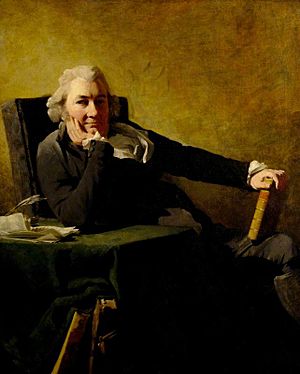Robert Cunninghame Graham of Gartmore facts for kids
Robert Graham (born 1735 – died 1797) was a Scottish politician and poet. He changed his name twice, first to Bontine in 1770, then to Cunninghame Graham in 1796. He is best known for his poem If doughty deeds my lady please. This poem was later turned into a song by his great-great-grandson, Rev. Malise Cunninghame Graham, and also by the famous composer Sir Arthur Sullivan.
Contents
Robert Graham's Early Years
Robert was born at Gartmore, Perthshire, in Scotland. He was the second son of Nicol Graham and Lady Margaret Cunningham. He and his older brother, William, studied at the University of Glasgow.
Robert spent a lot of his early life in Jamaica. There, he was involved in growing crops on plantations and trading goods. He also became a tax collector, called the Receiver-General for Taxes, in 1753. He gained wealth from his work with sugar plantations in the Caribbean.
Robert Graham and Jamaica
From 1752 to 1770, Robert Graham lived in the Colony of Jamaica. During this time, he owned land and plantations. He also owned enslaved people who worked on his plantations and as household servants. He profited from their forced labor. As a wealthy businessman, he oversaw large groups of enslaved workers. He later sold the enslaved people he owned when he returned to Scotland.
By 1753, when he was just 18, he was already the receiver-general of taxes. He also served as a representative for the area of St David in the Assembly of Jamaica from 1765 to 1767.
In 1770, Robert left Jamaica and moved back to Britain. He became the owner of the Ardoch estate in Dunbartonshire. He had inherited this estate after his second cousin, William Bontine, passed away.
Robert Graham's Family Life
While living in Jamaica, Robert Graham married Anne Taylor in 1764. Anne was the sister of Sir John Taylor, 1st Baronet and Simon Taylor (sugar planter). Simon Taylor was one of Jamaica's richest plantation owners.
Robert built the current Ardoch House near Dumbarton in a style similar to homes in the colonies, especially for Anne. Anne passed away in December 1780. She left behind two daughters and two sons.
Later, around 1783, Robert married Elizabeth Buchanan. They had another son and daughter together. However, they separated in 1787 and divorced in 1789.
Robert Graham's Estates
Robert Graham changed his last name twice because of family inheritances. First, when he inherited the Ardoch estate from William Bontine, he took the name Bontine. He used this name until his own father died.
Second, in 1796, he took on the name Cunninghame in addition to Graham. This happened after Major General John Cunninghame, the 15th Earl of Glencairn, passed away. Robert inherited the Finlaystone estate from him. Because of this, he is often known as Robert Cunninghame Graham of Gartmore and Finlaystone.
When Robert died, his lands were spread across several areas. These included Perthshire (Gartmore & Kippen), Dunbartonshire (Galingad & Ardoch), and Renfrewshire (Finlaystone). He also owned land in Lanarkshire and his plantation in Jamaica.
Robert Graham's Political Work
In 1794, Robert Graham was elected as a Member of Parliament for Stirlingshire. He was known as a Radical and supported the Jacobin ideas of his time. During his time in Parliament, he tried to introduce a Bill of Rights. This was a set of laws that aimed to protect people's rights. His ideas were similar to those in the Reform Bill of 1832, which brought important changes to voting rights.
He was good friends with several important people, including the actor Thomas Sheridan (actor), the politician Charles James Fox, and the poet Hector McNeil.
From 1785 to 1787, Robert Graham was the Rector of the University of Glasgow. This was an important position at the university. In 1787, he started the Gartmore Gold Medal. This medal was given every two years to a student who wrote the best essay about political freedom.
Robert Graham's Death and Legacy
In his later years, Robert Graham suffered from frequent health problems. He passed away at Gartmore on December 4, 1797. He was buried in the Gartmore family burial ground.
The famous Scottish poet Robert Burns described Graham as someone with "great talents, great fortune and great worth." Burns's patron, James, the 14th Earl of Glencairn, was Graham's first cousin.
Robert Graham's Descendants
Robert Graham's great-great-grandson was Robert Bontine Cunninghame Graham. He was a writer, journalist, and adventurer. He was also an important politician, serving as a Liberal Party Member of Parliament. He helped start both the Scottish Labour Party and the National Party of Scotland.
His great-great-great-grandson was Admiral Sir Angus Edward Malise Bontine Cunninghame Graham. He was a high-ranking officer in the Royal Navy. He was also the nephew and heir to Robert Bontine Cunninghame Graham.
 | Sharif Bey |
 | Hale Woodruff |
 | Richmond Barthé |
 | Purvis Young |


